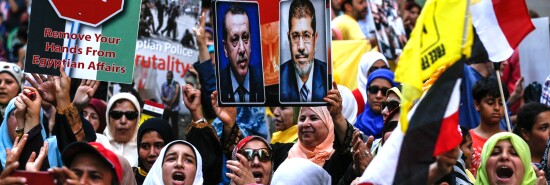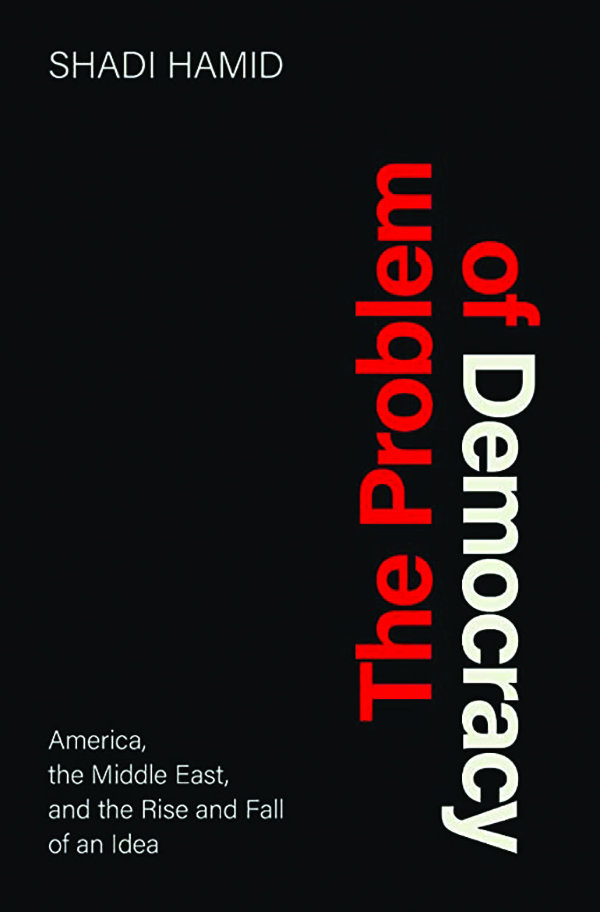
Democracy and disarray
Michael M. Rosen
On June 2, 1992, Edward Djerejian, a State Department veteran then serving as assistant secretary of state for Near Eastern Affairs, expressed concern over the emergence in Algeria of the Front Islamique du Salut, an Islamist political party that was leading in election polls before its disbanding by the military, triggering a decadelong civil war.
“We are suspect of those who would use the democratic process to come to power, only to destroy that very process in order to retain power and political dominance,” Djerejian asserted. “While we believe in the principle of ‘one person, one vote,’ we do not support ‘one person, one vote, one time.’”
The specter of Islamist parties such as the FIS or other Muslim Brotherhood offshoots gaining power by democratic means, extinguishing democracy altogether, consolidating power, and destabilizing the region has haunted Western policymakers for decades. Foreign policy experts have struggled mightily to resolve the tension between promoting freedom and ensuring stability in the Middle East.

But in The Problem of Democracy, a bold, thoughtful, scrupulously researched, but not entirely persuasive, assault on the Djerejian Doctrine, Brookings Institution scholar and journalist Shadi Hamid seeks to resolve this tension firmly and definitively in favor of democracy. Hamid champions “democratic minimalism,” which, in his view, “would privilege democracy, with its emphasis on the preferences of majorities or pluralities through regular elections and the rotation of power, over liberalism, which prioritizes individual freedoms, personal autonomy, and social progressivism.”
In his framework, democratic minimalism would “transform bilateral relationships in the Middle East,” “shift our own understanding of democracy at home,” and “better preserve America’s national interests — if not necessarily in the short term, then in the long run.” By favoring the promotion of elections in the Arab world over quixotic attempts to liberalize Islamic society, he reckons, the United States can achieve its objectives far more successfully.
To begin with, Hamid defines liberalism as “the ongoing project of carving out rights, with those rights deriving from a recognition of the dignity inherent to every human life” and contrasts it with democracy, writ small:
Democracy as a system and a set of procedures — as a way of regulating politics without predetermining its outcomes — allows Arabs and Muslims to decide their own course and determine what values are most important to them. To try to compel people to become Western-style liberals is the mark of hubris — bound to be either ineffective, unrealistic, or both. After all, a liberalism not freely chosen is self-negating.
But democracy, in the minimal sense of control by the most popular forces in a polity, can at times reduce itself to rampant majoritarianism, a challenge that Hamid readily acknowledges. He therefore posits that, in order to provide opposition parties with “a fair enough playing field,” basic rights, including the “freedom of speech, expression, and assembly,” would need to be enshrined in some form of constitution that would “establish … checks and balances through autonomous institutions, such as the judiciary, that can monitor and constrain abuses of executive power.”
But for such structure to restrain popular passions meaningfully, as they must, fledgling democracies would need to establish them on a fair and objective basis ab initio.
Hamid contends that “democracy is particularly suited for deeply polarized societies, and most Middle Eastern countries can safely be described as such.” But how well, exactly, has democracy served Lebanon and Iraq, two extremely fractious and sectarian polities? Both countries hold regular elections, power alternates occasionally, and certain institutional and denominational controls have taken root. (In Lebanon, the president is usually a Maronite Christian, while the parliamentary speaker is generally a Shia Muslim and the prime minister a Sunni Muslim; in Iraq, those roles are held, respectively, by a Kurd, a Sunni Arab, and a Shia Arab.) But would anyone reasonably claim that these countries function well politically or economically?
Indeed, Hamid, who found himself in Cairo at the peak of the revolution in Tahrir Square, recognizes the peril inherently attached to unconstrained democracy. “Ideological and religious diversity, in its unmediated state, can be overwhelming and chaotic,” he remembers thinking as Hosni Mubarak was being deposed. “Without strong institutions, it can easily give way not to a pluralism of reciprocity and respect but rather to existential conflict.”
Hamid also examines several contrapositives exemplified by Egypt, Jordan, and Algeria, where he argues the lack of democracy has stunted the natural development of each nation. In the 1980s, both Egypt and Jordan experienced a relative efflorescence of political freedom, as Mubarak and King Hussein, respectively, loosened the reins of power and enabled opposition groups such as the Muslim Brotherhood to gain a foothold in parliament. But both leaders reversed those early trends soon thereafter: Mubarak steadily tightened his autocratic grip until his 2011 ouster, and Hussein implemented voting mechanisms designed to dilute the Brotherhood’s power to clear the way for a peace treaty with Israel.
He also regards the 2013 Egyptian military coup, which terminated the short-lived experiment in Egyptian democracy, as a tragic missed opportunity. Mohamed Morsi, the Muslim Brotherhood leader who won election in 2012 with 51.7% of the vote (amid 52% voter turnout), got a raw deal, in Hamid’s estimation, from the United States and the rest of the international community, which indulged in “a failure to defend democracy.” He quotes the hapless John Kerry, secretary of state at the time, who fumed about the Brotherhood: “This stinks. These guys aren’t doing anything constructive, and ultimately, they are going to be antidemocratic.” Overthrowing the duly elected Morsi, in Hamid’s telling, amounted to a betrayal of democratic ideals.
But this account downplays the deeply antidemocratic measures Morsi himself applied once he had assumed power. In late 2012, in the words of New York Times reporter David Kirkpatrick, Morsi “issued a decree … granting himself broad powers above any court as the guardian of Egypt’s revolution.” He curtailed the authority of the Supreme Constitutional Court, arrogated prosecutorial powers to himself, targeted journalists, attacked protesters, and enacted a decree permitting 30-day detentions without charges. By the time the Egyptian military short-circuited Morsi’s tenure, his administration was itself well on its way to tyranny. In other words, the Morsi situation wasn’t a trade-off between freedom and stability; it was a Hobson’s choice between two different versions of authoritarianism.
Hamid asserts that Israel’s support for autocratic Middle Eastern regimes, coupled with the American commitment to forging peace between Israelis and Arabs, has undermined democracy in the region. That’s because, in his estimation, the “Arab street” despises the Jewish state with far greater vehemence than the authoritarian leaders of Israel’s putative Arab allies. So democratization would inherently involve unleashing anti-Israel sentiment. He instead urges the U.S. to redouble its efforts to ensure Israel’s qualitative military edge over its Arab neighbors while releasing the anti-Israel genie from the bottle in which it’s been stuffed by regional autocrats. He assesses his plan as one that promotes a “democracy-first” agenda instead of a “stability-first” one. Yet while Hamid’s proposal here is intriguing, it rests on a premise that appears to have been overtaken by events, as the Abraham Accords have uncovered the warmth toward and interest in the Jewish state expressed by a younger generation of Arabs in the UAE, Bahrain, Morocco, and even Saudi Arabia.
More broadly, perhaps those countries, where a young cohort of leaders is gradually but unmistakably liberalizing society, present a more promising alternative to democratic minimalism. Mohammed bin Salman of Saudi Arabia, Mohammed bin Zayed of the UAE, and King Mohammed VI of Morocco are highly controversial characters, and yet they appear determined to increase steadily the economic, political, sexual, and even religious freedom of the people they still consider their subjects. In Hamid’s framework, “democratization is what will facilitate political pluralism, which, in turn, will allow, in due time, for some semblance of religious pluralism.” But what if, as we’re seeing in parts of the Islamic world, the opposite is true? What if increased religious tolerance yields democratic gains, however painful and slow? While it may be unrealistic and even counterproductive to expect these moderating Arab states to inaugurate national democratic elections in the next five-to-10 years, their leaders are laying the groundwork for more enduring freedom, and we should applaud and bolster these efforts.
Indeed, nearly 10 years ago, two foreign policy scholars proposed a sweeping initiative called the Multilateral Endowment for Reform, which sought billions to fund “overhauling the civil service sector, justice sector reform, and anti-corruption initiatives” in the Arab world. This type of Marshall Plan for the Middle East would, at scale, “make comprehensive bureaucratic change a meaningful prospect, including in the security, judicial, and media sectors.” These steps would help build the political and economic infrastructure necessary for a gradual transition to multiparty democracy. One of the scholars to advance this stepwise liberalizing reform was none other than Shadi Hamid (the other, his collaborator Peter Mandaville of George Mason University). Hamid’s audacious present-day “democratic minimalism” offers surface appeal, and it reflects careful and creative thought. But his earlier, gradual approach contains greater wisdom.
Michael M. Rosen is an attorney and writer in Israel and an adjunct fellow at the American Enterprise Institute.
